

Computational thinking modules. Code-it supported by HIAS, Hampshire Inspection and Advisory Service. Code-it Gold is a new scheme of programming planning that provides multiple, research backed, methods of teaching the same module to help teachers develop a variety of different approaches and develop pupils agency.
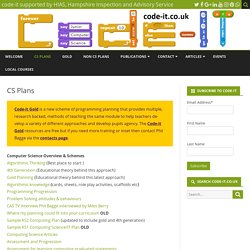
The Code-it Gold resources are free but if you need more training or inset then contact Phil Bagge via the contacts page. KS1 (4-7) PlanningKS1 Turtle (Bee-Bot or Roamer Too) OverviewBee-bot/Blue-bot Reception to Y2 Detailed Scheme of workBee-Bot Y1 Kahoot AssessmentBee-Bot Algorithm CardsBee-Bot Algorithm Cards2Robot Mouse Algorithm CardsHuman Crane AlgorithmKS1 How Supermarket WorksKS1 How a Library WorksKS1 How a Bank WorksKS1 Scratch Jr Travel Planning KS1 Scratch Jr Dance Planning KS1 Scratch jr I am special PlanningKS1 Scratch Jr Moving Game (Alt versions)KS1 Scratch Jr My StoryKS1 Scratch Jr PathwayKS1 Scratch Jr Best Friends App (Alt Versions)Technology Hunt Home & School LOGO PlanningLower KS2 Logo PlanningFirework Program in MSW LogoVideo Explaining Logo Planning.
Tutorials for MIT App Inventor. Computing ITT & CPD. This site has been put together by a small group of teachers and teacher educators convened by the DfE's Teaching Agency and chaired by Bob Harrison.
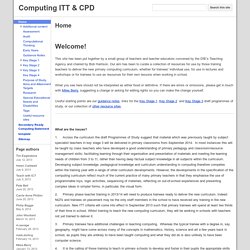
Our aim has been to curate a collection of resources for use by those training teachers to deliver the new primary computing curriculum, whether for trainees' individual use, for use in lectures and workshops or for trainees to use as resources for their own lessons when working in school. What are the issues? 1. Across the curriculum the draft Programmes of Study suggest that material which was previously taught by subject specialist teachers in key stage 3 will be delivered in primary classrooms from September 2014. 2. 3. Group work: Using cooperative learning groups effectively. Many instructors from disciplines across the university use group work to enhance their students’ learning.
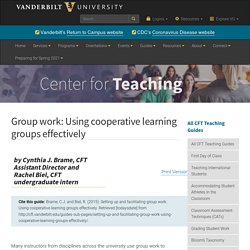
Whether the goal is to increase student understanding of content, to build particular transferable skills, or some combination of the two, instructors often turn to small group work to capitalize on the benefits of peer-to-peer instruction. This type of group work is formally termed cooperative learning, and is defined as the instructional use of small groups to promote students working together to maximize their own and each other’s learning (Johnson, et al., 2008).
Cooperative learning is characterized by positive interdependence, where students perceive that better performance by individuals produces better performance by the entire group (Johnson, et al., 2014). It can be formal or informal, but often involves specific instructor intervention to maximize student interaction and learning. What can it look like? Python overtakes French as the most popular language taught in primary schools. The programming language Python has overtaken French as the most popular language taught in primary schools, according to a new survey released today.
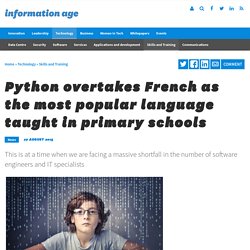
Six out of ten parents said they want their primary school age children to learn the coding language over French. And 75% of primary school children said they would rather learn how to programme a robot than learn a modern foreign language. The survey, which sampled 1,000 five to 11 year olds, 1,000 11 to 16 year olds and 1,000 parents, was commissioned by Ocado Technology to assess progress made since the new Computing curriculum was introduced exactly a year ago today. Computer science GCSE seen as ‘easy option’ While the results seem encouraging, further investigation reveals a worrying trend amongst older children. >See also: How a 7-year-old girl hacked a public Wi-Fi network in 10 minutes It has also created Rapid Router, a free coding teaching resource that is being used by over 30,000 schools, pupils and teachers.
Moodle. Moodle. Love Letters to Computers. Love Letters for Computers is a free resource including a series of videos, resources, classroom materials and a teacher journal that will help you plan how to integrate computer science into your curriculum for children in kindergarten and first years of primary school.
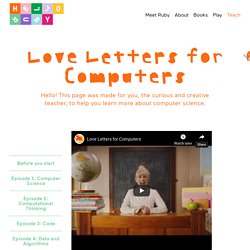
It’s built around the philosophy of Hello Ruby: an unplugged, creative and playful approach to introducing computer science. If you’re interested in additional hands-on training or translating this material, visit the More section. Before jumping in, make sure to download and print the following: Computing At School. 22/01/2019 We have made updates to our Privacy Policy, please take time to read it.
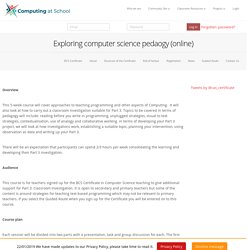
Privacy Policy Dismiss message Search CAS Community Forgotten password? Overview. Your Back-to-School Bootcamp with our free online training. Are you ready to FEEL THE BURN…of your heating laptop?
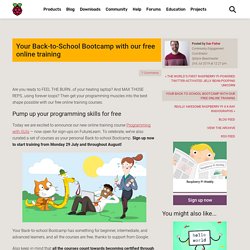
And MAX THOSE REPS…using forever loops? Then get your programming muscles into the best shape possible with our free online training courses. CS Unplugged. KS2 Data. National Centre for Computing Education. Develop your understanding of algorithms to successfully teach this topic in GCSE computer science.
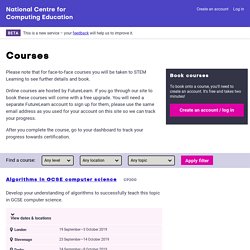
Tags for this course: Algorithmic thinkingComputingMathematicsKey stage 4CS Accelerator Build your knowledge and understanding of computer networks as a computer science teacher Computer networksComputingKey stage 3Key stage 4CS Accelerator This course will provide you with the theory, background and practical application to design and build a curriculum leading to increased engagement and student success Cross curricularLeadershipComputingKey stage 3 Help your students understand computer systems, binary code and processor performance.
ComputingCS Accelerator This course helps teachers of GCSE to develop their classroom practice and deliver outstanding teaching of GCSE computer science ComputingKey stage 4 Explore the fundamentals of computing - computer architecture, binary logic, data processing, circuits, and more. Primary computing resources.